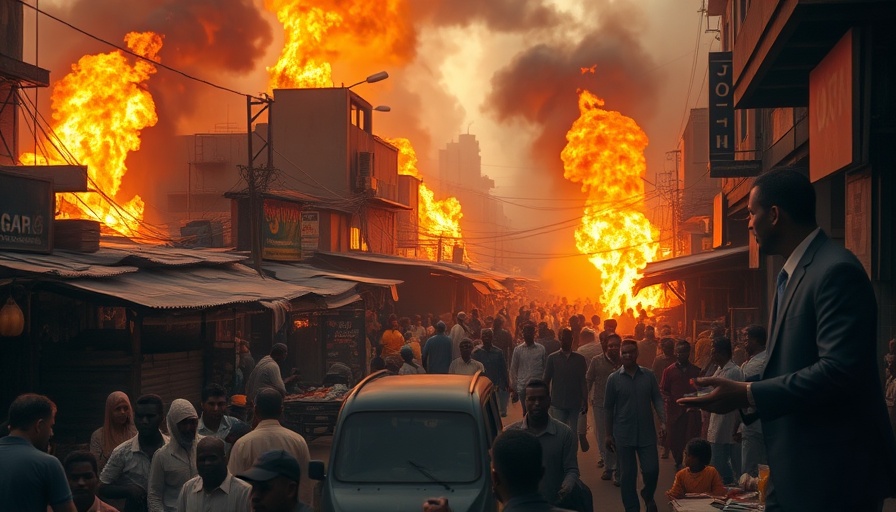
Chaos Erupts as Lagos Fires Inflict Devastating Blows
In a day that felt more like a nightmare repeated than a mere coincidence, fire engulfed Lagos Island twice, resulting in chaos, loss, and deep-rooted questions about the city’s infrastructural integrity. The twin infernos struck at the Afreland Tower on Broad Street and Central Plaza at Mandelas, wreaking havoc not only on property but on the livelihoods of traders and workers entangled in these disasters.
In 'Lagos Blaze: Afriland Tower & Mandilas Market Fires Cause Chaos,' the discussion dives into the pressing issues surrounding infrastructural integrity and safety standards, prompting a deeper analysis on our end.
The Afreland Tower Blaze: Impact and Response
Beginning around 1:30 p.m., the fire at Afreland Tower erupted in the basement inverter room, rapidly spreading throughout the commercial building. Inside, panic ensued as the thick smoke filled the air, forcing tenants and shoppers to frantically seek escape routes, some scaling walls and others using makeshift ladders. The firefighting response, involving teams from Ibuta Leo and Sari GMO stations, managed to rescue nine individuals, with several suffering from smoke inhalation and shock. Four sustained critical injuries, leading to urgent medical care.
Sadly, this disaster was a cruel prelude to the next tragedy. The ongoing investigation into the fire hints at infrastructural deficiencies, which have become a recurring theme in Lagos. If the loss of human lives was narrowly avoided, it leads us to the critical reflection of how often safety standards have been overlooked in this bustling metropolis.
Crisis Continues at Central Plaza: The Traders’ Heartbreak
The misery deepened just hours later when Central Plaza was engulfed in flames around 8 p.m. This massive blaze raged through the night, devastating the shopping complex known as a linchpin for local traders. As daylight broke, an overwhelming stark reality emerged: billions of naira worth of inventory lies in ruins, along with years of hard-earned investments by local businessmen and traders. Their futures, now having been reduced to charred remains, reflect a broader tragedy of economic downturn.
News Central’s correspondent reported on the prevailing despair, as traders grappled with the loss of their businesses, an essential part of what sustains the fabric of their community. The ongoing conversations between emergency services and security officials also highlight worrying signs; fires like these are revealing an urgent need for structural assessments of commercial buildings in one of Africa's major economic hubs.
The Broader Implications of Infrastructural Negligence
The repeated occurrences of such destructive blazes raise an urgent question: Are we witnessing the consequences of systemic negligence in safety protocols? In both incidents, the swift escalation of flames raises alarms about outdated infrastructure and inadequate fire safety regulations. These events serve not just as reminders of the immediate dangers but reflect a deeper challenge for Lagos—a city grappling with exponential growth in population and commerce at the expense of adherence to safety standards.
Effective auditing of electrical systems, rigorous enforcement of building codes, and comprehensive insurance schemes must no longer be treated as optional. As investigations unfold about the cause of these fires, the urgency of preserving human life and economic stability must supercede the inertia of bureaucracy.
The Role of Media and Publicity
The journalistic endeavor of reporting on incidents of this caliber should not be underestimated; however, it brings about a stark reality when news crews face harassment while documenting such critical events. An unwarranted silencing of the media undermines the community's right to uncover and understand the truths behind these catastrophes.
Indeed, when the narrative is unshielded from public scrutiny, the city has an opportunity to learn and enforce changes that could prevent future disasters. Therefore, we urge Nigerian authorities and citizens alike not to overlook the lessons hard-learned from these events—emphasizing that prevention, transparency, and accountability are paramount.
What Lies Ahead: Reform or Regression?
The recent fires not only serve as a devastating reminder of the fragility of life and commerce but also compel us to advocate significant reforms. Municipal authorities must address the essential need for safety assessments and emergency response systems capable of protecting residents and businesses from future infernos. The question remains if Lagos can muster the will to enact change in the midst of chaos or if it will continue to bear the scars of neglect.
As we reflect on the aftermath of the Afreland Tower and Central Plaza fires, we must hold ourselves accountable—to demand better from our infrastructure and engage with our representatives for improved safety standards. The burden lies not just on those directly affected but on all stakeholders involved in shaping our communities moving forward. Only through collective action can we hope to prevent another tragic day in Lagos.
 Add Row
Add Row  Add
Add 


Write A Comment